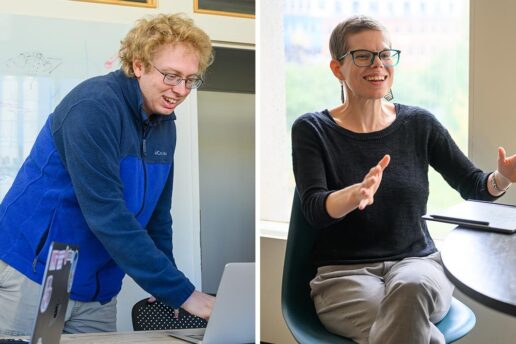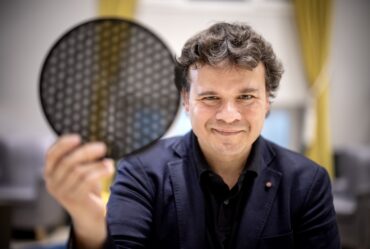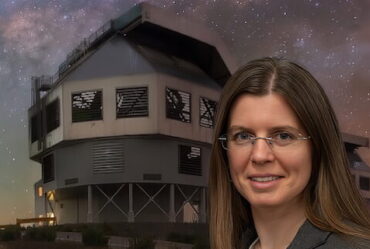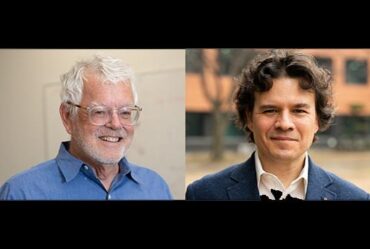
Unparalleled student support
Professors Andrew Vanderburg and Ariel White are honored as “Committed to Caring.”
MIT Professors Andrew Vanderburg and Ariel White have been honored as Committed to Caring for their attentiveness to student needs and for creating a welcoming and inclusive culture. For MIT graduate students, the Committed to Caring program recognizes those who go above and beyond.
Professor Vanderburg “is incredibly generous with his time, resources, and passion for mentoring the next generation of astronomers,” praised one of his students.
“Professor Ariel White has made my experience at MIT immeasurably better and I hope that one day I will be in a position to pay her kindness forward,” another student credited.
Andrew Vanderburg: Investing in student growth and development
Vanderburg is the Bruno B. Rossi Career Development Assistant Professor of Physics and is affiliated with the MIT Kavli Institute for Astrophysics and Space Research. His research focuses on studying exoplanets. Vanderburg is interested in developing cutting-edge techniques and methods to discover new planets outside of our solar system, and studying these planets to learn their detailed properties.
Ever respectful of students’ boundaries between their research and personal life, Vanderburg leads by example in striking a healthy balance. A nominator commented that he has recently been working on his wildlife photography skills, and has even shared some of his photos at the group’s meetings.
Balancing personal and work life is something that almost everyone Vanderburg knows struggles with, from undergraduate students to faculty. “I encourage my group members to spend free time doing things they enjoy outside of work,” Vanderburg says, “and I try to model that balanced behavior myself.”
Vanderburg also understands and accepts that sometimes personal lives can completely overwhelm everything else and affect work and studies. He offers, “when times like these inevitably happen, I just have to acknowledge that life is unpredictable, family comes first, and that the astronomy can wait.”
In addition, Vanderburg organizes group outings, such as hiking, apple picking, and Red Sox games, and occasionally hosts group gatherings at his home. An advisee noted that “these efforts make our group feel incredibly welcoming, and fosters friendship between all our team members.”
Vanderburg has provided individualized guidance and support to over a dozen students in his first two years as faculty at MIT. His students credit him with “meeting them where they are,” and say that he candidly addresses themes like imposter syndrome and student feelings of belonging in astronomy. Vanderburg is always ready to offer his fresh perspective and unwavering support to his students.
“I try to treat everyone in my group with kindness and support,” Vanderburg says, allowing his students to trust that he has their best interest at heart. Students feel this way as well; another nominator exclaimed that Vanderburg “genuinely and truly is one of the kindest humans I know.”
Vanderburg went above and beyond in offering his students support and insisting that his advisees will accomplish their goals. One nominator said, “his support meant the world to me at a time where I doubted my own abilities and potential.”
The Committed to Caring honor recognizes Vanderburg’s seemingly endless capacity to share his knowledge, support his students through difficult times, and invest in his mentees’ personal growth and development.
Ariel White: Student well-being and advocacy
White is an associate professor of political science who studies voting and voting rights, race, the criminal legal system, and bureaucratic behavior. Her research uses large datasets to measure individual-level experiences, and to shed light on people’s everyday interactions with government. Her recent work investigates how potential voters react to experiences with punitive government policies, such as incarceration and immigration enforcement, and how people can make their way back into political life after these experiences.
She cares deeply about student well-being and departmental culture. One of her nominators shared a personal story describing that they were frequently belittled and insulted early in their graduate school journey. They had battled with whether this hurtful treatment was part of a typical grad school journey. The experience was negatively impacting their academic performance and feeling of belonging in the department.
When she learned of it, White immediately expressed concern and reinforced that the student deserved an environment that was conducive to learning and well-being, and then quickly took steps to talk to the peer to ensure their interactions improved.
“She wants me to feel valued, and is dedicated to both my growth as a scholar and my well-being as a person,” the nominator expressed. “This has been especially valuable as I found the adjustment to the department difficult and isolating.”
Another student commended, “I am constantly in awe of the time and effort that Ariel puts into leading by example, actively fostering an inclusive learning environment, and ensuring students feel heard and empowered.”
White is a radiant example of a professor who can have an outstanding publishing record while still treating graduate students with kindness and respect. She shows compassion and support to students, even those she does not advise. In the words of one nominator, “Ariel is the most caring person in this department.”
White has consistently expressed her desire to support her students and advocate for them. “I think one of the hardest transitions to make is the one from being a consumer of research to a producer of it.” Students work on the rather daunting prospect of developing an idea on their own for a solo project, and it can be hard to know where to start or how to keep going.
To address this, White says that she talks with advisees about what she’s seen work for her and for other students. She also encourages them to talk with their peers for advice and try out different ways of structuring their time or plan out goals.
“I try to help by explicitly highlighting these challenges and validating them: These are difficult things for nearly everyone who goes through the PhD program,” White adds.
One student reflected, “Ariel is the type of advisor that everyone should aspire to be, and that anyone would be lucky to have.”


